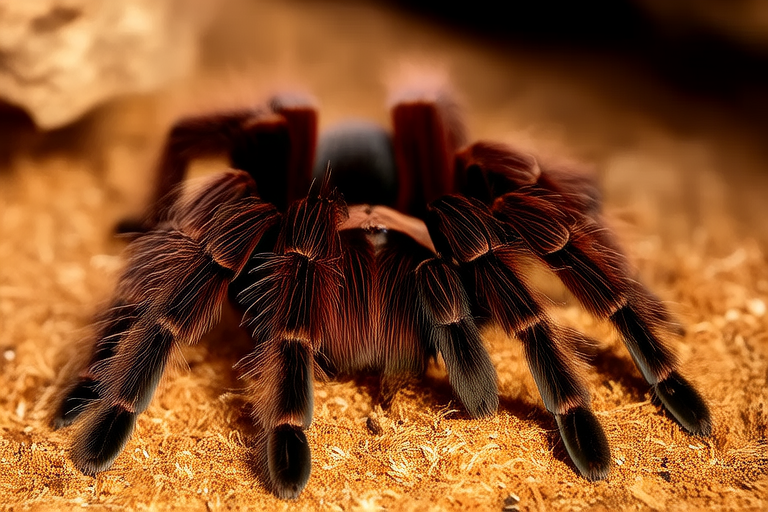Adopting a Chilean Rose Tarantula: Tips for First-Time Owners
Welcome to the fascinating world of tarantulas! If you’re considering adopting a Chilean rose tarantula, you’re embarking on an exciting journey. These spiders are one of the most popular choices for first-time arachnid owners due to their docile nature and relatively low maintenance requirements. However, owning a tarantula comes with significant responsibilities. This guide will provide you with all the essential information you need to ensure your new pet thrives.
Understanding Your New Pet
The Chilean rose tarantula (Grammostola rosea) is native to the deserts and scrublands of South America. They are known for their gentle temperament and striking appearance, with their soft, pinkish hairs giving them a rosy hue. Despite their intimidating appearance, they are quite docile and rarely bite unless provoked.
Responsibilities and Commitment
Owning any pet requires a commitment, and tarantulas are no exception. Before bringing a Chilean rose tarantula home, consider the time and resources needed for proper care. Tarantulas can live up to 20 years, so it’s important to be prepared for this long-term commitment.
Habitat Setup
A well-designed habitat is crucial for the health and happiness of your tarantula. Here’s what you need:
- Terrarium Size: A 10-gallon tank is suitable for an adult Chilean rose tarantula. The enclosure should be at least three times the length of the spider.
- Substrate: Use coconut fiber, peat moss, or vermiculite as bedding. It should be kept slightly damp to mimic the natural humidity of their desert environment.
- Hiding Spots: Provide ample hiding places like cork bark, half logs, or pre-made caves.
- Temperature and Humidity: Maintain temperatures between 75-85°F (24-29°C) and humidity levels around 60-80%. Use a hygrometer and thermometer to monitor these conditions.
Feeding Guidelines
Chilean rose tarantulas are carnivorous and require a diet of insects. Here are some tips:
- Diet: Feed them crickets, mealworms, or dubia roaches once or twice a week. Dust the prey with calcium and vitamin supplements before feeding.
- Proportions: Offer prey items that are no larger than the width of the tarantula’s abdomen.
- Water: While tarantulas drink very little water, misting the substrate weekly helps maintain humidity levels.
Handling Advice
While Chilean rose tarantulas are generally calm, they may react defensively if mishandled. Here’s how to handle them safely:
- Gentle Handling: Always use a wide-mouthed container or tongs when handling. Never grab them by the legs or abdomen.
- Patience: Allow your tarantula to get used to your presence before attempting to handle it. Some individuals may never be comfortable being handled.
- Observation: Watch for signs of stress, such as rearing or flicking urticating hairs, which are fine hairs on their abdomen used for defense.
Common Health Issues
Like any pet, tarantulas can face health challenges. Here are some common issues and how to address them:
- Molting Problems: During molting, tarantulas shed their exoskeleton. Ensure the enclosure is humid and free from disturbances during this process.
- Breathing Issues: Respiratory problems can occur if the temperature or humidity is too high. Monitor these conditions closely.
- Parasites: Keep the enclosure clean and inspect your tarantula regularly for signs of parasites.
Myths Debunked
There are many misconceptions about tarantulas. Let’s clear up some common myths:
- Myth: Tarantulas are dangerous to humans. Fact: While their bites can be painful, they are not venomous enough to cause serious harm to humans.
- Myth: Tarantulas are aggressive. Fact: Chilean rose tarantulas are generally calm and avoid confrontation.
- Myth: Tarantulas don’t need much space. Fact: Providing adequate space ensures their physical and mental well-being.
Personal Experience
When I first brought my Chilean rose tarantula home, I was nervous about handling her. She was tiny and delicate, but over time, she became more comfortable with me. One day, she even allowed me to gently move her into a new, larger enclosure without any fuss. Watching her explore her new home was a rewarding experience. Each interaction has been a learning process, teaching me patience and respect for her needs.
Conclusion
Owning a Chilean rose tarantula can be a deeply rewarding experience. With the right care and attention, your tarantula can thrive and bring joy to your life. Remember, the key to successful tarantula ownership is understanding their unique needs and providing a safe, comfortable environment. Happy tarantula keeping!
